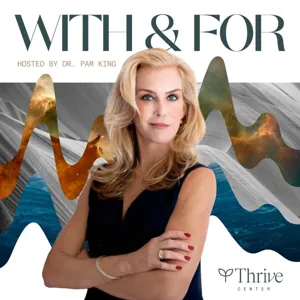Responding to Trauma: Psychological Tools for Resilience and Recovery with Dr. Cynthia Eriksson

Note: This episode contains content about trauma. Listener discretion is advised.
The path toward hope and healing is often charted through pain, suffering, loss, and grief.
Coming from two decades spent studying post-traumatic stress disorder, researcher and clinical psychologist Dr. Cynthia Eriksson Cynthia has worked with individuals and communities in the wake of major tragedy. Her psychological and spiritual perspectives emerge from first hand experience with Cambodian children exposed to the atrocities of war, Ugandan refugees, Haitian victims of earthquake catastrophe and infrastructure collapse, or at home in Pasadena tending to frontline workers who are often left burned out and traumatized from relief work.
Cynthia Eriksson discusses how to pursue resilience and recovery by reflecting on the role of faith and spirituality; habits and rhythms of life; and relationships and community.
How should we understand the difference between resilience and thriving?
Resilience focuses on the adaptive capacities that people need to bounce back from trauma, creating the capacity to bounce back, and the skills to increase one’s ability and agility to recover. Whereas thriving refers to adaptive growth through adversity, trauma, challenges, and opportunities, all the while in pursuit of one’s purpose.
Both resilience and thriving recognize the complexities of life, and both affirm and require the actualization of human agency.
In this conversation with Cynthia Eriksson, we discuss:
- How leaders and helpers and caretakers can identify trauma in themselves, and come to recognize, accept, and respond.
- The importance of paying attention to our brains, bodies, and environment.
- The 5 R’s of resilience to trauma and recovery from trauma.
- Spiritual responses to suffering and pain—which can often result in incredibly profound experiences with God—and this includes expressing anger at God within a struggle.
- And practically, we talk about how to deal with avoidance, defensiveness, and blaming others or ourselves—basically, the potentially destructive nature of coping mechanisms.
- And we close with a beautiful grounding practice that connects us all to our bodies and emotions, to engage trauma, and stay on the path to thriving.
Show Notes
- Resource: "Thriving through Trauma: Five R’s for Resilience and Recovery" (via thethrivecenter.org)
- Resource: "Practice: The Five R’s of Resilience and Recovery" (via thethrivecenter.org)
- Resilience versus thriving—what’s the difference?
- What is trauma? A threat to existence.
- Extending from trauma to suffering and helping other people build resilience and recover
- Cynthia Eriksson’s personal experience of trauma (and not realizing it)
- Problem solving and seeking control as a coping mechanism and defense against acknowledging and dealing with trauma
- Dissociation
- Experiencing trauma is not the same thing as being traumatized
- Fight, flight, freeze, or fawn (”tend and befriend”)
- The symptoms of trauma and areas of disruption
- What happens in our bodies
- What happens in our minds (thinking)
- What happens in our relationships
- What happens in our sense of meaning, justice, and making sense of the world
- Resilience
- “What are some of the things that we can all do that help us to build some muscles when it comes to navigating life's suffering?
- Resilience as a skill everyone can cultivate through personal growth, rather than a static trait
- “Neurons that fire together wire together.”
- The Five R’s of Resilience
-
- Regulation: bodies and emotions
-
- Reflection and Right Thinking: truth and factual acceptance
-
- Relationships: community, connection, friendship, and support
-
- Respite and Rest: disengagement and Sabbath healing
-
- Reason: meaning and transcendence
- How to deal with big, overwhelming feelings in the wake of trauma.
- Grounding and settling practices: feeling where you are. “I’m here now, and I’m safe.”
- Lament as a healthy spiritual response to trauma
- Anger at and with God
- Spiritual practice of lament
- Asking a hard question of God: “Why aren’t you here, God?”
- Lament and anger at God as a practice to stay in relationship with God
- “There’s this tension of: “If I show up for God, will God show up for me?”
- Orienting to the pain and suffering of others: “How do I show up for the people that are around me who are in pain what does it mean for me to actually open myself up to the pain of others and stay present?”
- “Do justice, love mercy, and walk humbly.” (Micah 6:8)
- Coping mechanisms: substances, shopping, Netflix, avoidance
- Unhealthy responses to trauma-based emotion: the dangers of replaying, ruminating, and regretting
- Rumination is not a constructive processing.
- What kind of grace can I show myself?
- Book: Resmaa Menakem, My Grandmother's Hands: Racialized Trauma and the Pathway to Mending Our Hearts and Bodies
- Book: Lisa Najavits, Seeking Safety: A Treatment Manual for PTSD and Substance Abuse
- Guided meditative practice: Grounding
- Explaining the science behind Grounding Practices
- Practical ways to get help
- Book: Bessel van der Kolk, The Body Keeps the Score: Braim, Mind, and Body in the Healing of Trauma
- Book: Judith Herman, Trauma and Recovery: The Aftermath of Violence—from Domestic Abuse to Political Terror
- Book: Resmaa Menakem, My Grandmother's Hands: Racialized Trauma and the Pathway to Mending Our Hearts and Bodies
- National Child Traumatic Stress Network (currently under website maintenance as of March 4, 2024; contact helpdesk at help@nctsn.org or in an emergency, dial 911)
- National Center for PTSD
- Cynthia Eriksson on What is thriving?
- Joy and Freedom
- Pam King’s Key Takeaways
- A life of thriving on purpose actually includes pain and sadness. A history of trauma is not a disqualification from thriving.
- Coping strategies are tricky. They tempt us towards avoidance, defensiveness, defensiveness, substance abuse, blaming, and self judgment. Our goal is not coping. Our goal must be thriving.
- Lots of R's here, but regulation, reflection, right thinking, relationships, respite, and rest, and reason are core components to developing resilience and enacting recovery.
- It's okay to be angry at God, and it helps to tell God that's actually the case.
- We can find emotional grounding and regulation through intentionally enhancing a deep connection between our bodies and minds.
- And the path to thriving is often one where our minds need to follow our bodies and all their glorious complexity.
- For more information about resilience recovery, org. In Cynthia Erickson's framework of five hours, visit our website at thethrivecenter.org.
About Cynthia Eriksson
Cynthia Eriksson is Dean of the Fuller School of Psychology & Marriage and Family Therapy, and is a Professor of Psychology in the Clinical Psychology Department.
Her research is particularly focused on the needs of cross-cultural aid for mission workers, as well as the interaction of trauma and spirituality. This work has included trauma training, research, and consultation in Monrovia, Liberia; Kobe, Japan; Phnom Penh, Cambodia; Amsterdam, the Netherlands; Barcelona, Spain; Guatemala City, Guatemala; Gulu, Uganda; and Amman, Jordan.
Eriksson also collaborated with colleagues in the US, Europe, and Africa on a longitudinal research project on stress in humanitarian aid workers funded by the Centers for Disease Control and Prevention in Atlanta. She also participates in the Headington Program in International Trauma at Fuller.
She has completed research on risk and resilience, exposure to stress, and spiritual development in urban youth workers funded by the Fuller Youth Institute.
Eriksson and her students are currently exploring the intersection of cultural humility and culturally-embedded resilience practices through collaborations with ministry agencies and Fuller colleague Alexia Salvatierra.
About the Thrive Center
- Learn more at thethrivecenter.org.
- Follow us on Instagram @thrivecenter
- Follow us on X @thrivecenter
- Follow us on LinkedIn @thethrivecenter
About Dr. Pam King
Dr. Pam King is Executive Director the Thrive Center and is Peter L. Benson Professor of Applied Developmental Science at Fuller School of Psychology & Marriage and Family Therapy. Follow her @drpamking.
About With & For
- Host: Pam King
- Senior Director and Producer: Jill Westbrook
- Operations Manager: Lauren Kim
- Social Media Graphic Designer: Wren Juergensen
- Consulting Producer: Evan Rosa
Special thanks to the team at Fuller Studio and the Fuller School of Psychology & Marriage and Family Therapy.










![From Stuck to Transformed: a Coaching Chat with Bernard Kates [EP 7]](https://www.podcastworld.io/podcast-images/coaching-chats-qxoucxi7.webp)





